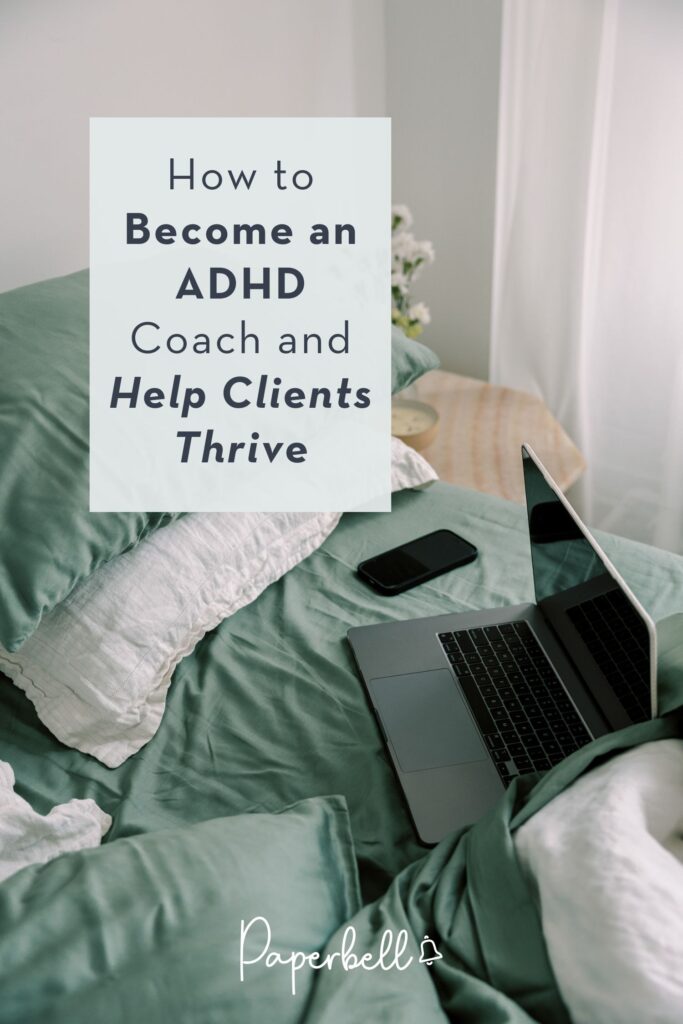As an ADHD coach, you can guide your clients through practical strategies to manage time, stay organized, and build habits that work for their unique brains.
Here’s how to become an ADHD coach, from getting certified to building a sustainable coaching practice serving your dream clients.
What Does an ADHD Coach Actually Do?
ADHD coaches provide practical, action-oriented support for people with Attention Deficit Hyperactivity Disorder (ADHD).
Unlike therapy, which often explores past experiences and emotional challenges, coaching focuses on the present and future, helping clients develop strategies to manage time, stay organized, and build habits that work for their neurodivergent brains.
While a life coach has a broader focus on a person’s personal development, a professional ADHD coach specializes in the specific executive function challenges that come with ADHD. They offer tailored strategies to help clients:
- Manage their schedules without feeling overwhelmed
- Overcome procrastination and follow through on tasks
- Develop routines that actually stick
- Navigate work, school, or home life with more confidence
Depending on their niche, ADHD coaches might work with:
- Adults with ADHD who struggle with career challenges, time management, or everyday organization
- College students who need help balancing coursework, deadlines, and personal life
- Parents of ADHD children who want to create supportive structures at home while managing their own stress
- Teens who need guidance in building independence and self-regulation skills
As an example, imagine a college student who keeps missing deadlines, even though they care deeply about their grades. An ADHD coach might work with them to create a system that breaks assignments into smaller steps, uses external reminders, and builds accountability into their routine.
Or consider an adult professional who starts every week with big goals but ends up getting distracted, leaving important tasks unfinished. Their coach could help them experiment with scheduling techniques, build self-check-ins, and identify the best tools to keep them on track.
ADHD coaching isn’t about “fixing” someone’s brain; it’s about working with their natural tendencies and strengths to create a system that works for them.
Do You Need Specific Training to Become an ADHD Coach?
If you’re thinking about becoming an ADHD coach, you might be wondering: Do I need a formal certification, or can I just start coaching?
Coaching, in general, is not a legally regulated profession, meaning you don’t have to get certified or get a license to practice. However, adequate training is highly recommended, especially when you work with clients who have special needs. Certifications boost your credibility and ensure you have the right coaching skills to create lasting changes in your clients’ lives.
So while formal training isn’t required by law, coaches in this niche generally have either ADHD-specific training or a combination of other relevant certifications.
Organizations like the ADD Coach Academy (ADDCA) offer specialized training in ADHD coaching, covering everything from executive function challenges to evidence-based coaching techniques.
Getting certified can:
- Increase your credibility: Clients (and their parents, if you work with teens) often feel more comfortable hiring a coach with recognized training.
- Provide proven strategies: Instead of guessing what works, you’ll learn research-backed methods to help clients with ADHD succeed.
- Improve your confidence: Knowing you have expert training helps you show up with certainty and provide real value to your clients.
That said, some ADHD coaches start without formal certification, especially if they have lived experience with ADHD or a background in related fields like education, psychology, or life coaching. If you go this route, it’s still important to invest in learning, whether through books, workshops, or mentorship from experienced ADHD coaches.
Already a Life Coach?
If you’re already a life coach, ADHD coaching builds on many of the same core skills, such as goal setting, accountability, and client empowerment. But ADHD coaching goes deeper, focusing specifically on executive function challenges like:
- Time blindness – struggling to estimate or track time
- Task initiation – getting started on important but overwhelming tasks
- Working memory – holding and organizing information in real time
- Emotional regulation – managing frustration, impulsivity, or motivation dips
Traditional coaching methods often assume that clients can follow through on tasks once they set a goal. ADHD coaching recognizes that follow-through is the challenge. So instead of just setting goals, you help clients develop systems, external supports, and adaptive strategies to make success more achievable.
All in all, training as an ADHD coach equips you with the tools to address the real challenges that hold clients back.
Top ADHD Coaching Certification Programs
If you’re serious about becoming a certified ADHD coach practitioner, choosing the right program can set you up for success.
While there’s no single required path, several well-respected programs offer specialized ADHD coaching training. Below, we’ll break down three of the most recognized options, including what they cover, how long they take, and their costs.
1. ADD Coach Academy (ADDCA)
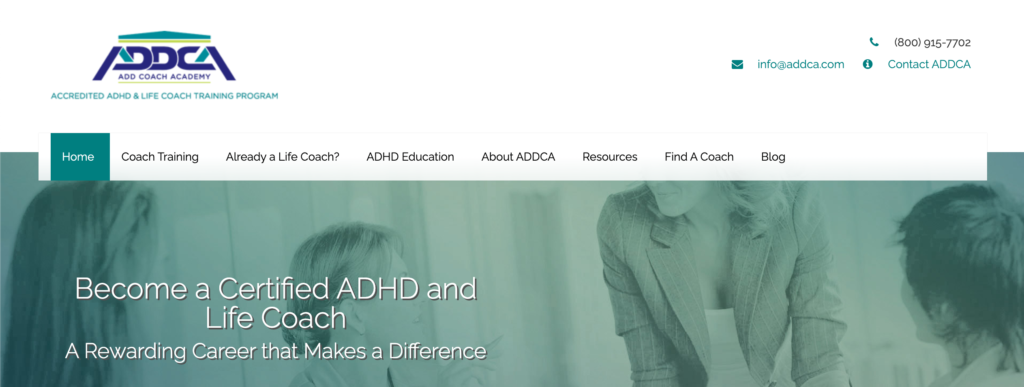
ADDCA is one of the most well-known ADHD coach training programs with a structured curriculum based on coaching best practices. It covers ADHD-specific challenges, brain-based coaching techniques, and practical client management strategies.
Duration:
- The Basic Program (AAC) takes about 8 months to complete.
- The Advanced Program (PAC) takes an additional 12+ months beyond the basic program.
Cost:
- Basic Program (AAC): $7,071
- Advanced Program (PAC): $13,252
This is a great option for anyone looking for a comprehensive, highly regarded ADHD coaching certification with ICF accreditation.
2. iACTcenter (International ADHD Coach Training Center)
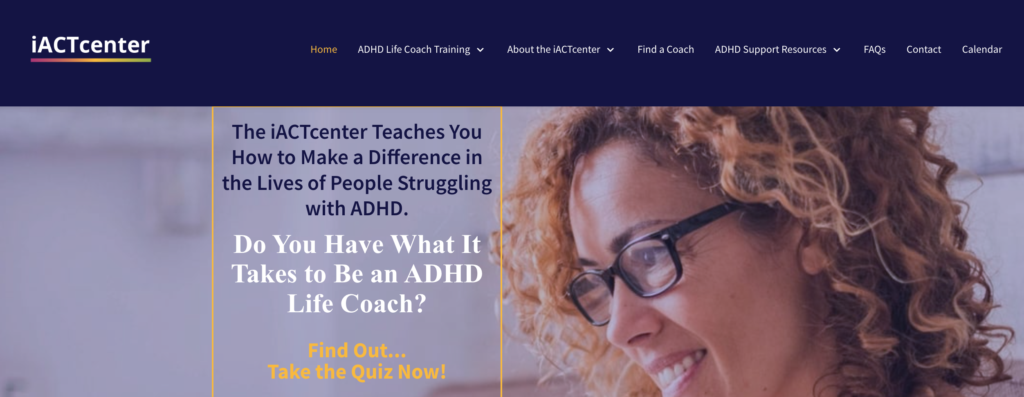
The iACTcenter offers an immersive, year-long ICF-accredited training program in ADHD coaching with coach-specific training, hands-on practice, personalized supervision, and expert mentoring. Graduates earn the Certified ADHD Life Coach (CALC) credential.
Duration: One year
Cost: $9,700
It’s great for coaches who want in-depth, ADHD-focused training with ICF-certified instructors.
3. JST Coaching & Training
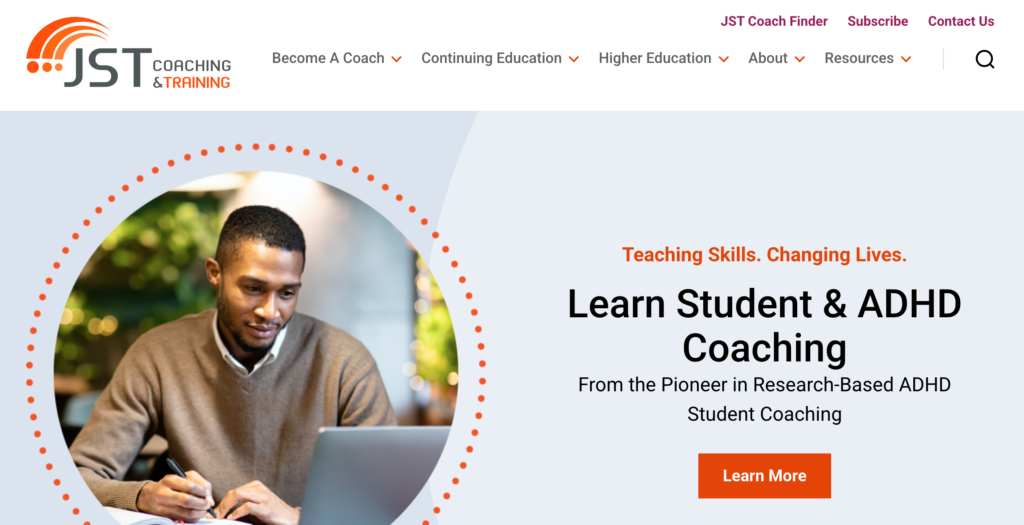
Empowering Students Through Coaching (ESTC) is an ICF-accredited, research-based, and comprehensive coach training program for ADHD or neurodiversity coaching. It’s based on JST’s own coaching model, which has been proven to improve self-regulation in ADHD students through a two-year study.
Duration: 8 months
Cost: $8,499
It’s best for coaches who prefer research-based training and want to work with children, teens, and young adults with ADHD.
4 Steps to Getting Certified as an ADHD Coach
Becoming certified is a process that usually takes anywhere between six months and two years. It requires commitment and plenty of practice hours, but it’s something that can lay the foundation for a life-long career in ADHD coaching.
Here’s how you can get started.
Step 1: Get Familiar With the Basics
Before jumping into a certification program, it’s helpful to understand ADHD beyond common misconceptions. This means learning about executive function challenges, time management struggles, emotional regulation, and how ADHD affects different age groups.
You may do this by:
- Reading books by experts like Dr. Russell Barkley or Edward Hallowell
- Taking free or low-cost introductory ADHD courses
- Listening to ADHD-focused podcasts or attending webinars
This step gives you a solid foundation and helps you decide if ADHD coaching is the right path for you.
Step 2: Consider Certification Options
Once you have a better understanding of ADHD basics, you may consider committing to a comprehensive program, like the ones listed above. Consider the following factors:
- Do you need ICF credentials?
- Do you want to learn from a particular expert or a specific methodology?
- What’s your budget?
- Do you prefer online or in-person classes?
- How much time can you commit to your training and what schedule works for you?
Step 3: Complete Your Program
ADHD coaching programs are typically a mix of:
- Live instruction and self-paced coursework
- Mentorship or supervised practice coaching (often required for certification)
- Real client coaching hours, where you work with ADHD clients
During this step, you’ll gain confidence using coaching techniques in action.
Step 4: Get Certified
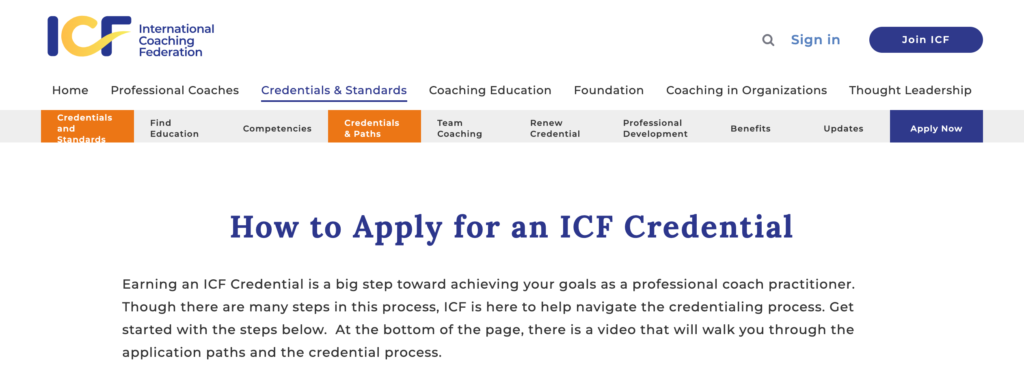
ADHD coaching programs typically require you to complete a final assessment and submit certain documentation to get credentialed. If your program is ICF-accredited, you must apply for your ICF credentials separately by submitting the required materials and paying your application fee.
Once certified, you’re officially an ADHD coach! But the work doesn’t stop there: You’ll need to start building your practice.
Building Your ADHD Coaching Business
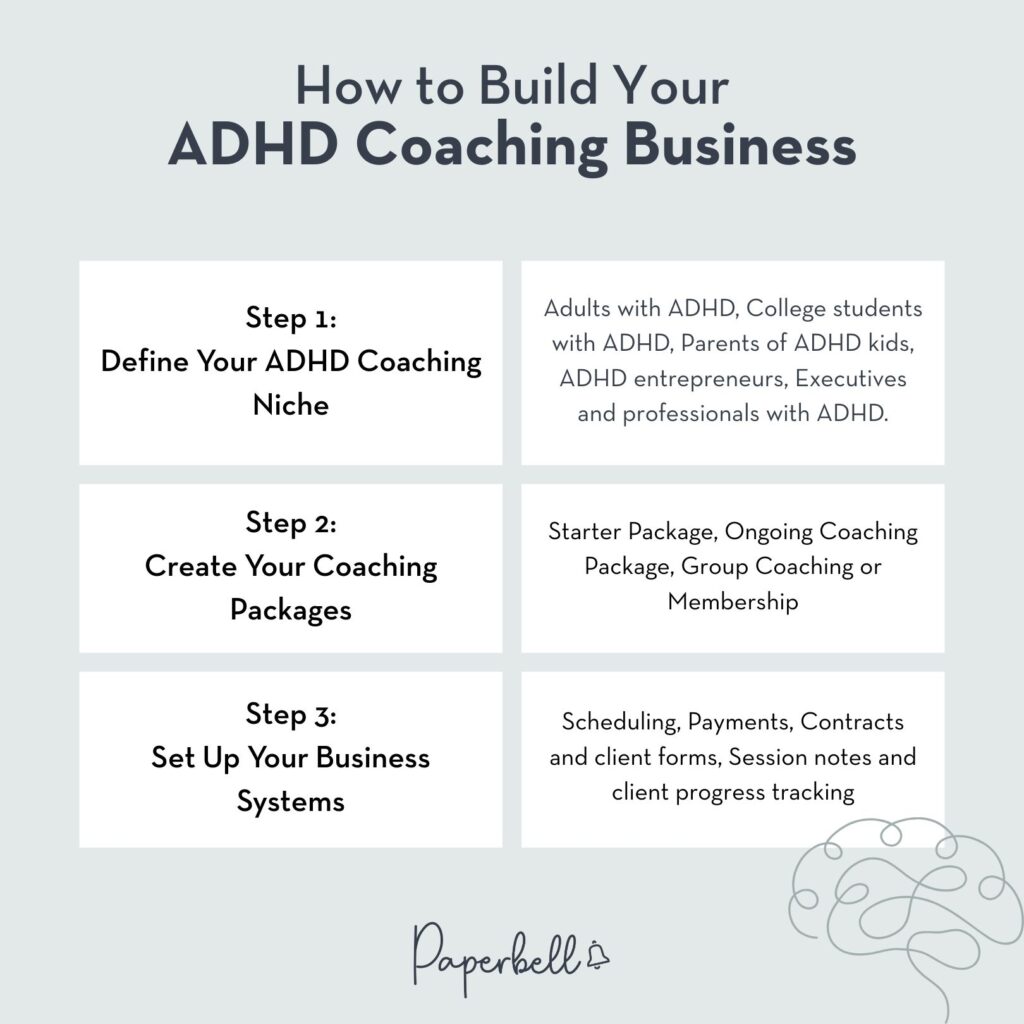
Once you’re certified (or even while you’re training), the next step is turning your skills into a professional business. ADHD coaching is in high demand, but to attract the right clients and run your practice smoothly, you need a solid foundation.
Step 1: Define Your ADHD Coaching Niche
Not all ADHD coaching is the same. Clients seek coaching for different reasons, from time management struggles to career transitions to parenting an ADHD child. Finding a niche makes it easier to market your services and attract the right clients.
Here are some common ADHD coaching niches:
- Adults with ADHD: Help adults with focus, organization, and productivity.
- College students with ADHD: Support students in managing coursework, deadlines, and executive function challenges.
- Parents of ADHD kids: Coach parents on how to create structure and advocate for their child’s needs.
- ADHD entrepreneurs: Help business owners stay organized, manage overwhelm, and stay consistent.
- Executives and professionals with ADHD: Focus on career growth, workplace strategies, and leadership skills.
Think about your background and strengths. If you have experience in corporate settings, ADHD career coaching might be a great fit. If you worked in education, student coaching could be your niche.
Step 2: Create Your Coaching Packages
ADHD clients often struggle with consistency, so your coaching packages should be structured in a way that keeps them engaged while allowing for flexibility.
Instead of offering just single-session coaching, consider these options:
1. Starter Package (Short-Term Coaching)
- Best for clients who want to solve a specific problem but aren’t ready for a longer commitment.
- Example: An ADHD Productivity Boost program with four sessions over one month.
- Focuses on quick wins, like structuring daily routines or tackling procrastination.
2. Ongoing Coaching Package (Retainer Option)
- Best for clients who need consistent support over time.
- Example: ADHD Success Plan with 12 sessions over 3-6 months.
- Includes weekly or biweekly coaching, accountability check-ins, and progress tracking.
3. Group Coaching or Membership (Scalable Option)
- Best for clients who want peer support and coaching at a lower cost.
- Example: A monthly ADHD coaching membership with group calls and resources.
- Creates a community feel and is a great option if you want to serve more clients at the same time.
Be upfront about what’s included in each package, how your coaching process works, and what kind of support they get between ADHD coaching sessions.
Step 3: Set Up Your Business Systems
It’s time to streamline your business operations. Running a coaching business means handling:
- Scheduling (so clients can book sessions without back-and-forth emails)
- Payments (so you don’t chase clients for coaching fees)
- Contracts and client forms (so everything is legally sound and all key information is documented)
- Session notes and client progress tracking (so you stay organized)
Instead of juggling multiple tools, an all-in-one coaching platform like Paperbell can simplify everything in one place and automate your admin work.
With Paperbell, you can set up:
- Custom packages with your chosen pricing structure, from payment plans to subscriptions.
- A professional coaching website for your brand and dedicated landing pages for each of your packages plugged right into your client management system.
- Automated secure payments required before clients can book you.
- Automated bookings with your personalized availability.
- Digital contract signing, surveys, and client information documented for each client.
- Digital downloads and coaching materials stored for each package or added to clients individually.
- Automated emails scheduled at the exact time you need them.
- Dedicated client portal for each client you work with.
As an example, if a client signs up for a 6-month ADHD coaching package on your Paperbell landing page, they will be automatically redirected to settle their payment, sign your contract, and schedule their first session without the need to reach out.
You can schedule automated emails for them to onboard them, remind them of deliverables, and keep them accountable—a big win for ADHD clients.
With this set-up-and-forget system, you can give your ADHD coaching clients the best experience while eliminating manual client management tasks and saving up more time for coaching.
FAQ
Do I Need to Have ADHD Myself to Be an Effective ADHD Coach?
No, but it can help with understanding your clients’ experiences. The key is having the right training, empathy, and tools to support ADHD clients effectively.
How Much Can ADHD Coaches Earn?
Earnings vary, but certified ADHD coaches typically charge $100-$300 per session, depending on experience, niche, and business model.
How Long Does It Take to Build a Sustainable ADHD Coaching Practice?
It typically takes 6-24 months to gain traction, depending on your marketing efforts, network, and client referrals. Many coaches start part-time before transitioning to full-time.
Can I Coach Clients Remotely/Virtually?
Yes! Many ADHD coaches work 100% online using video software like Zoom, allowing them to reach clients globally and offer flexible scheduling.
Is There Enough Demand for ADHD Coaching Services?
Awareness of ADHD is growing, and many adults, students, and parents seek coaching for focus, productivity, and life management skills. Demand is rising.
What Challenges Might I Face When Working With ADHD Clients?
ADHD clients may struggle with consistency, follow-through, and time management. You’ll need flexible strategies and a strong accountability system to work with them.
What Coaching Tools and Techniques Are Most Effective for ADHD Clients?
Body doubling, visual timers, structured goal-setting, accountability check-ins, and tailored routines help ADHD clients stay on track and build lasting habits.
Build a Thriving Practice
Ready to start building your coaching business? Paperbell makes it easy to set up your website and manage your clients with its simple, all-in-one system, perfect for ADHD coaches. Try it for free today and see how simple client management can be.
